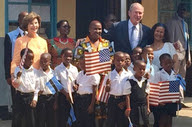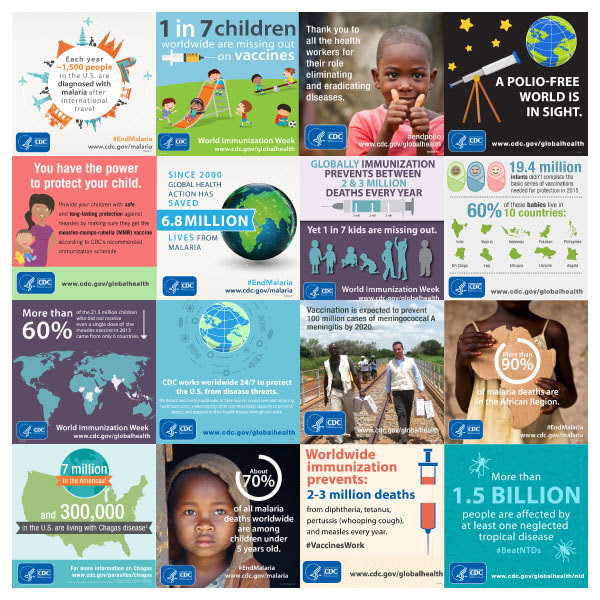A Premium On Speed In The Fight Against Disease

By Rebecca Martin, Director of the Center for Global Health
We have a need for speed.
CDC’s Center for Global Health (CGH) has always understood this reality and the necessity for finding and attacking disease at its source, before it can escape and spread.
With the world ever more compressed by modern travel and global commerce, CDC has adapted and developed new tools to confront the world as it is. The Global Rapid Response Team (GRRT) is the latest example of that evolution.
Launched in 2015, the GRRT is the real-life example of CDC’s fast-twitch muscles, with 50 experts ready to deploy anywhere in the world within 24-48 hours. Despite being relatively new, GRRT can point to results, including work in Haiti after Hurricane Matthew in October 2016 where CDC experts helped activate an Incident Management System for the first time, and provided disease surveillance, laboratory, water, sanitation and hygiene epidemiology, and policy and communications support to the response.
These lessons learned are applicable to many CDC global efforts. The basic foundation to transform surveillance into intervention, just as we’ve done with malaria, includes tools such as rapid diagnostic tests (RDTs) which make it possible to distinguish malaria from other illnesses. Surveillance helps determine the most effective tools and treatment for the best allocation of resources.
Over the last two years, in fact, GRRT experts have supported more than 140 responses and provided assistance at mass gatherings and natural disasters in 18 countries ranging from Angola, Guinea, Panama, India, Vietnam, and the Marshall Islands.
CDC staff who are the GRRT are multidisciplinary by design, composed of experts from across CDC who can establish a “beachhead” in the crucial early opening days or weeks of an outbreak: from disease-specific expertise to operations to communications.
This broad skill set allows the GRRT to adapt and to respond nimbly as conditions change that help create the framework that is necessary for an effective response.
|

On the global health front, we know that the faster we detect disease outbreaks, the faster we can define them, launch an effective and decisive response, and isolate them. Speed, combined with strong science and technical experience, saves lives and better protects Americans from the dangers of disease outbreaks no matter where they occur.
That certainty, combined with an array of expert staff and highly regarded CDC global and domestic training programs that include Global Disease Detection, the FETP, and the Epidemic Intelligence Service (EIS), CDC and the public health workforce built in countries are constantly refining and improving their ability to respond and assist in the effort to protect people’s health, wherever the need is.
All of these programs – and many other efforts – allow us to move fast and with purpose. That ability makes all of us safer and healthier.
|
 

CDC’s Field Epidemiology Training Program (FETP) trains the next generation of “disease detectives” to effectively respond to health threats across the globe. FETP resident and photographer Tambri Housen of Australia was recently awarded 1st place prize for this photo at the International Night Photo Contest held during CDC’s annual Epidemic Intelligence Service (EIS) Conference in April. The image, taken in India, depicts FETP residents conducting a household interview selection in the Kashmir Village.
|

Secretary Price Visits CDC

HHS Secretary calls CDC a "jewel to our nation"
During his visit, HHS Secretary Tom Price met briefly with CDC senior leaders, took a tour of the flu lab, and emphasized his strong commitment to and support of CDC and its important public health work. He shared his appreciation for the staff and commented that “CDC is an absolute jewel to our nation and to have it in my hometown makes it extra special.” Later this month, Secretary Price will be traveling to the annual World Health Assembly in Geneva, Switzerland and will also visit West Africa. |
Global Health Diplomacy

CDC Hosts HHS Leaders and Health Attachés
CDC’s senior global health leadership met March 31 with new HHS political appointees Tom Alexander, Kyle Zebley, and Kamran Daravi as well frontline HHS country representatives stationed in China, India, South Africa, Mexico, Vietnam, Belgium, and Switzerland. The day-long session highlighted CDC’s multi-faceted global health work and how that effort saves lives as well as the traditionally strong relationships between CDC staff and their counterpart health attachés in the field and in Washington.
The visit also offered an opportunity to underscore how collaboration is important because health initiatives historically have represented a diplomatic bedrock fostering engagement and creating an entry point for broader engagement. That history underscored the meeting’s agenda, which included a panel discussion on infectious disease, a meeting with CDC Acting Director, Dr. Anne Schuchat, and a CDC global health seminar on health diplomacy featuring remarks from the health attachés. The March 31 visit was far from unique. In fact, CDC has hosted 17 high level delegations so far this year, including President Juan Carlos Varela of Panama as well as senior health officials from Japan, India, the World Health Organization and Nigeria, among others.
|
Working Towards an AIDS-free generation

Former President visits Botswana and Namibia
Former U.S. President George W. Bush; his wife, Laura Bush; and the U.S. Global AIDS Coordinator, Ambassador Deborah Birx, visited Botswana and Namibia last month in support of the global health of women and girls in the developing world. They visited a CDC-supported clinic to highlight the impact of HIV and cervical cancer services. |
CDC experts publish new research about the Global Plan towards the elimination of new HIV infections
The latest issue of JAIDS features studies from CDC experts on the accomplishments and lessons learned from the Global Plan, which aimed to reduce the number of new HIV infections in 2015 among children and keep their mothers alive. CDC is dedicated to ensuring that HIV care is available to those around the world who need it the most. 
On the Web
Social Media Highlights
 |
|









No hay comentarios:
Publicar un comentario